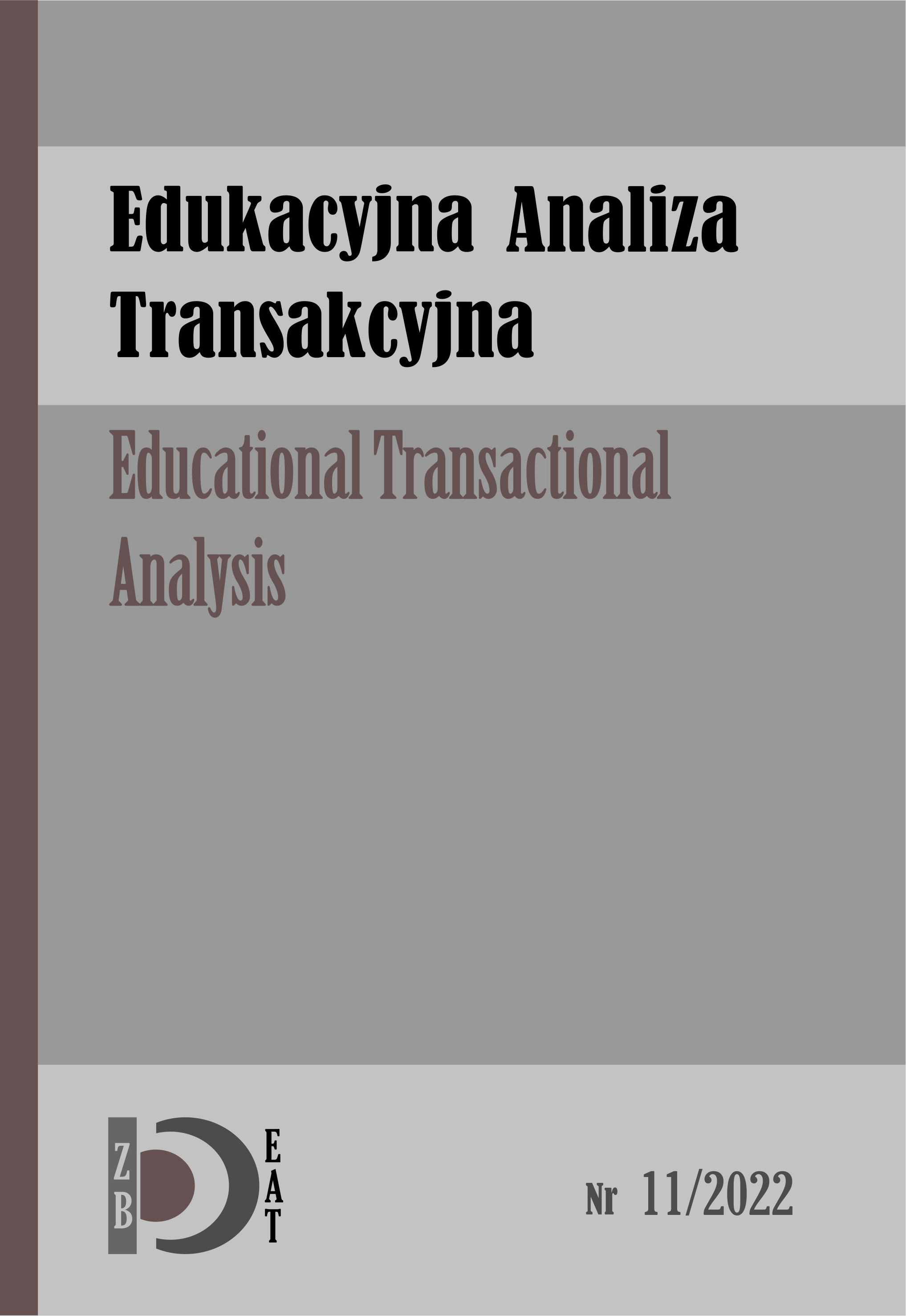Constructing own professional career by students of pedagogy
- Authors
-
-
-
Mirosław Mielczarek
University of Humanities and Economics in Lodz
-
- Keywords:
- career, constructing a professional career, work, career construction theory M. L. Savickas, pedagogy students
- Abstract
-
The article presented here consists of a typical triad for research report works. The first part
presents a theoretical approach to career construction. In this respect, it was based on
M.L. Savickas’ constructionist theory. The second part of the article describes the methodology of
the own research undertaken, the subject of which was the construction of careers by students
of pedagogy. The aim of the research was to get to know the views of pedagogy students on the
issue of constructing their own professional career. The research procedure was supposed to answer the question of completion: what are the views on the construction of one’s own professional career presented by students of pedagogy? The answer to the adopted research problem
was searched by the form of qualitative content analysis, for which a proprietary research tool
was constructed. The research was embedded in the paradigm of pragmatism, which puts emphasis primarily on the practical effectiveness of problem solving. For this reason, it was decided that
the most rational methodological solution for the given research problem would be the adoption
of a qualitative strategy. The last part of the article contains the results of the author’s own research, which, among other things, shows that some students of pedagogy combined their professional career with the work of a teacher/pedagogue. - Downloads
-
Download data is not yet available.
- References
-
Bańka, A. (2014). Bezdecyzyjność kariery jako psychospołeczny wzór tranzycji do dorosłości: Konstrukcja i charakterystyka psychometryczna. Skali Decyzyjności Kariery. Czasopismo Psychologiczne – Psychological Journal, 20(2), 237–246.
Creswell, J.W. (2013). Projektowanie badań naukowych. Metody jakościowe, ilościowe i mieszane. Kraków: Wydawnictwo Uniwersytetu Jagiellońskiego.
Cybal-Michalska, A. (2015). (Meta)analityczna wartość założeń teorii karieryprzyczynek do dyskusji na temat teorii konstrukcji kariery Marka L. Savickasa. Studia Poradoznawcze, 4, 52–63.
Goriszowski, W. (2006). Podstawy metodologiczne badań pedagogicznych. Warszawa: Wydawnictwo Wyższej Szkoły Pedagogicznej TWP.
Guzik-Tkacz, M. (2011). Badania diagnostyczne w pedagogice i psychopedagogice. Warszawa: Wydawnictwo Akademickie Żak.
Hsieh, H.F., Shannon, E. (2005). Three Approaches to Qualitative Content Analysis. Qualitative Health Research, 15(9), 1277–1288.
Kukla, D., Mielczarek, M. (2019). Orientacje zawodowe młodzieży niedostosowanej społecznie wobec kariery zawodowej. Szkoła – Zawód – Praca, 17, 259–274.
Kukla, D., Mielczarek, M. (2021). Predyspozycje zawodowe młodzieży niedostosowanej społecznie. Przyczynek do planowania samodzielności zawodowej. Edukacja Ustawiczna Dorosłych, 1(112), 177–188.
Maree, J.G. (2010). Brief Overview of the Advancement of Postmodern Approaches to Career Counselings. Journal for Psychology in Africa, 20(3), 363–376.
Minta, J. (2012). Od aktora do autora. Wspieranie młodzieży w konstruowaniu własnej kariery. Warszawa: Krajowy Ośrodek Wspierania Edukacji Zawodowej i Ustawicznej.
Piróg, D. (2018). Kariera zawodowa nauczycieli w warunkach przemian w systemie edukacji: zarys stanu badań. Przedsiębiorczość – Edukacja, 14, 495–509.
Savickas, M.L. (2004). The Theory and Practice of Career Construction. In: S.D. Brown, R.W. Lent (ed.), Career development and counseling. PuttingTheory and Research to Work (pp. 42–70). New Jersey: John Wiley & Sons.
Savickas, M.L. (2012). Life Design: A Paradigm for Career Intervention in the 21st
Century. Journal of Counseling & Development, 90, 311–352.
Wiatrowski, Z. (2000). Podstawy pedagogiki pracy. Bydgoszcz: Wydawnictwo Uczelniane WSP.
Wiatrowski, Z. (2009). Dorastanie, dorosłość i starość człowieka w kontekście działalności i kariery zawodowej. Radom: ITE-PIB.
- Downloads
- Published
- 2022-12-30
- Issue
- No. 11 (2022)
- Section
- On the border of fields
- License
-
Copyright (c) 2022 Daniel Kukla, Mirosław Mielczarek

This work is licensed under a Creative Commons Attribution 4.0 International License.
AUTHOR'S STATEMENT
I am aware that the Educational Transactional Analysis journal is published under a Creative Commons license - Attribution (https://creativecommons.org/licenses/by/4.0/legalcode).
By submitting the article, I agree to make it available under this license
How to Cite
Similar Articles
- Dorota Pankowska, dr hab., Analiza transakcyjna w edukacji czy edukacyjna analiza transakcyjna? , The Educational Transactional Analysis: No. 1 (2012)
- Bogumiła Bobik, Happiness and hope in the consciousness of the young generation - analysis of perception and experience , The Educational Transactional Analysis: No. 14 (2025)
- Małgorzata Świerk, Needs that are not included in the schedule – transactional analysis of students’ (future teachers’) experiences , The Educational Transactional Analysis: No. 14 (2025)
- Monika Czyżewska, Ewa Duda, Magda Lejzerowicz, Anna Perkowska-Klejman, Ada Sarnat-Ciastko, Edyta Zawadzka, Tutoring: meanings attributed to the concept by tutors. An analysis of the semantic field , The Educational Transactional Analysis: No. 12 (2023)
- Joanna Miecznik-Warda, Polish Educational Needs of Young Educators in the Context of Transactional Educational Hungers and in Relation to Professional Personality Types , The Educational Transactional Analysis: No. 13 (2024)
- Monika Adamska-Staroń, Studying pedagogical theories. The perspective of Pedagogy students from Jan Długosz University in Częstochowa. , The Educational Transactional Analysis: No. 13 (2024)
- Zbigniew Chodkowski, The feeling of efficiency in the opinion of the surveyed students of Rzeszów universities , The Educational Transactional Analysis: No. 11 (2022)
- Dorota Podgórska-Jachnik, Interinstitutional support and deinstitutionalization of social services for individuals with disabilities as a context for inclusive education , The Educational Transactional Analysis: No. 13 (2024)
- Beata Gumienny, Psychiatrization as a mechanism for handicapping students with intellectual disability. Psychiatrisation in education , The Educational Transactional Analysis: No. 13 (2024)
- Milena Miałkowska-Kozaryna, Do Studies Provide Knowledge, Skills, and Social Competences – Are You Sure? , The Educational Transactional Analysis: No. 13 (2024)
You may also start an advanced similarity search for this article.
Most read articles by the same author(s)
- Daniel Kukla, Mirosław Mielczarek, Education through work as a consciously organized activity to prevent risky behaviours of children and adolescents , The Educational Transactional Analysis: No. 14 (2025)


